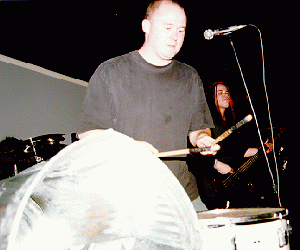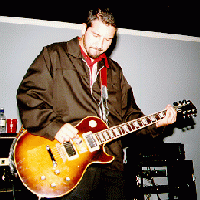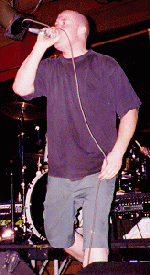

Jester: Was the west coast tour you did with Deathline International and The Razor Skyline a success?
Mike Welch: Well it was only one show. We only played Seattle.
Kevin: Was that the first show you have ever done outside of the Bay Area?
Mike Paikos: Well we have played in Davis and Sacramento.
Jester: Would you like play outside of the Bay Area and maybe go on a real tour?
Mike Welch: We would love to tour, but most of us have jobs.
Alan: If someone offered a whole bunch of money to tour, we'd probably all jump at the chance.
Jester: How was the Seattle show?
Mike Welch: I'm not sure because I only looked up during the first few songs and the venue was rather empty. People did at least seem to be nodding their heads and clapping though.
Alan: Seattle seems to have more of a Gothic scene and we don't seem to appeal to Goths very well.
Jester: I know you are in the middle of working on a new album. How is it proceeding?
Mike Welch: It is going really slow. Before the Seattle show we were proceeding rather steadily but then we had to practice for Seattle and this show so we just stopped recording. Shawn Brice of Battery is engineering our album and Battery was supposed to play last night so that also put a stop to things. The creativity isn't what seems to be slowing us down it is much more of a time issue.
Jester: Do you have a working title or a self-imposed release date yet?
 Mike Welch: We don't know the release date yet but COP
International says that they want it in September but I cannot guarantee it
will be done by then. The current working title is "Fuse" even though the
current rumor mill states that it is "Fusion".
Mike Welch: We don't know the release date yet but COP
International says that they want it in September but I cannot guarantee it
will be done by then. The current working title is "Fuse" even though the
current rumor mill states that it is "Fusion".
Jester: How did Slave Unit end up signed to COP International when your style of music isn't very similar to the usual COP artist?
Torsten: Actually, one of the reasons that they did sign us is because we do sound different from the rest of their roster.
Mike Welch: COP keeps telling everyone that they are going to try and diversify but we seem to be the only band that fits that mold at the moment. Whenever we play shows with another band on the label we always seem to stand out format-wise from them.
Kevin: Do you find that you don't interact with the crowd very well because of that?
Mike Welch: Yes. We like playing shows but we feel that we could play to other crowds. It's not that we don't like this crowd, but I feel that we could bridge to other types of crowds.
Alan: I think that we are one of the few bands these days that shouldn't have to play to the Gothic Industrial niche community. We should be able to play to a more mainstream type of audience.
Mike Welch: For example I haven't even heard Soil & Eclipse or Pulse Legion. I'd expect them both to be very electronic so that when we come onstage later tonight, the crowd will be rather put back.
Torsten: Yet we are always totally geared to play live shows and we try to instill a great deal of Punk Rock energy into the crowd whenever we play live.
Mike Welch: We probably spent the first 2-3 years together as a band not doing any recording. As a result most of the bands that are along the same style of music as us, don't seem to have near as much energy as we do. Most of those bands have spent more time in the studio than onstage and don't really know how to put on a energetic live performance. A lot of times those bands will be mostly on digital tape and won't be doing much onstage.
Jester: Is that why you have the extra drum and percussion onstage so that you can get really into the music when you are not singing?
Mike Welch: Definitely. Unfortunately tonight's show is the last night that Rey Osborne, our live drummer will be playing with us. He is leaving us to focus more on his band Tinfed. So we will be auditioning for a new live drummer as well as trying to add an extra percussionist to our next live show. Hopefully it will make us a bit more interesting to look at.
Alan: I think it will help flesh out our music and make us sound a bit thicker in a live setting. Since our recorded tracks are not all that heavy on the layering we have to work a bit harder to make the music seem really complex live.
 Kevin: Do you feel that your Punk influence is what keeps
you trying to become more and more energetic during your live shows?
Kevin: Do you feel that your Punk influence is what keeps
you trying to become more and more energetic during your live shows?
Mike Welch: I think a portion of it is the Punk sound but a lot of it is from just growing up and seeing a lot of bands perform. I have seen too many bands who sound good musically but who have no stage presence. They can put out really good albums but their live performance suck. So because we started out just playing live instead working on albums we want to make our live shows as entertaining as possible.
Mike Paikos: Most of us grew up going to hardcore show throughout high school and we are kind of used to using the stage as much as possible. Most of our first bands were Punk Rock projects and we all learned to never be one of those bands who just stand there when they play.
Jester: How did you first get involved with making music and playing live?
Mike Welch: I was in a bunch of Punk bands but then I realized that most people were only in it for the image. I was getting really tired of being in bands where people would show up late to practice or not at all. I really wanted to do music but I eventually got to the point where I felt that I could not rely on anyone else. I'd go to practice and be the only one there and it would be frustrating.
I got so fed up that I sold my guitar, a half-stack of amps, and the rest of my equipment. With the money I bought a 4-track and a drum machine because I was starting to get into the Industrial thing. It was a style of music that I could do by myself without the aid of other, mostly undependable people. So I started to make tapes and share them with people where I worked.
I just happened to be working with Mike Paikos, our guitarist, and he really liked the music. He and some other people suggested that we ought to do something together. So in what little spare time we all had between school and work, we messed around musically together. Then I met Torsten who was in another band with me previously. Eventually we all just ended up slowly getting together and making music.
Kevin: Are you pretty happy with all of the people in the band now?
Mike Welch: Well we are thinking about kicking out Alan. Seriously, I do think we are all getting pretty use to each other now and can depend on each other. For example we lost our drummer and Rey came in to help us out, there was always an understanding that eventually he would have to move on to focus more on his band. So about a month ago he informed us that he would be leaving and we all understood it.
Jester: Your vocals seem very personal and political. From where do you draw your lyrical influences?
 Mike Welch: Personal experience. Usually when something
happens to me that I personally think is wrong, it makes me angry. Normally I
am not that aggressive of a person so I really like using my lyrics to get that
aggressive side of me out. For the most part when people bother me, I just try
and exit the situation rather than confront it. So my vocals are a way of
venting my frustration.
Mike Welch: Personal experience. Usually when something
happens to me that I personally think is wrong, it makes me angry. Normally I
am not that aggressive of a person so I really like using my lyrics to get that
aggressive side of me out. For the most part when people bother me, I just try
and exit the situation rather than confront it. So my vocals are a way of
venting my frustration.
Usually it is triggered from a number of personal incidents where people all seem to act the same. Most people make fun of things they don't understand, but in my case I just get frustrated and write lyrics. Usually I write songs from the basis of someone's else viewpoint. For example the song 'Think' is about the majority of people not thinking or caring about their actions or what they say. Sometimes I do think I come off a bit rough and people get pissed but all I am trying to do is understand why people act the way that they do.
Jester: How do you sit down and compose new material? Do you start with vocals?
Mike Welch: No. We usually start with a cool beat or a rhythm that one of us is messing around with. Then we will present it to the group and everyone will start adding new material to it. Other times one of us will write a large portion of a track all on their own and the rest of us will only add a few bits and pieces. For the most part there really isn't a standard method.
Jester: What would you consider you favorite Slave Unit track?
Mike Welch: As a band I think the cover song that we do by Minor Threat called 'Guilty of Being White' or 'Think' would be our favorite.
Jester: Do you know how well your album has been doing?
Mike Welch: I know I don't. "I don't know"
Torsten: So far everyone has been either positive or middle of the road about the album. There may be some negative feedback but we haven't read it.
Mike Welch: Our label gives us all of the reviews they get and we read stuff on-line but we haven't seen anything bad. People still seem to like our live shows so we take that as a good sign.
Torsten: We have actually already made money off our first release which is very rare for a band like us. We have already gone into our second pressing but we don't know what the actual sales have been.
Jester: Is there anything else you would like to add in conclusion?
Mike Paikos: I won't mention any names, but some of us are working on another project called Officer Down with members of other bands. It is a mixture of Punk and pissed off Industrial music so be on the lookout for a release really soon. There are a lot of other members involved and we have finished our album first but it should be pretty interesting.